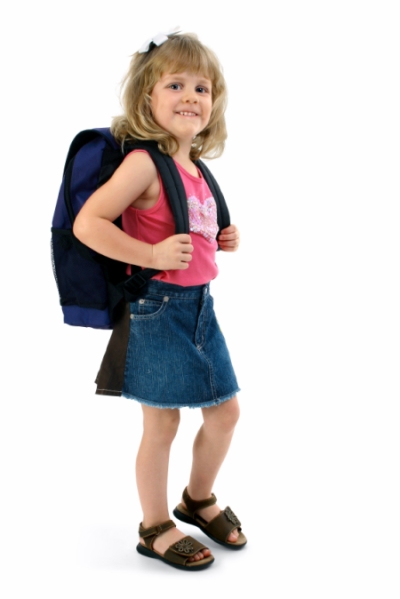Lexington, KY- Chiropractic Pediatricians are warning parents of the dangers of heavy backpacks after a 5-year-old Kentucky kindergarten student died from total spinal collapse (Accordion syndrome) on Friday.

Kentucky backpack victim Clarinet Applebee’s, shown here mere seconds before her entire spinal column collapsed.
“We are seeing massive numbers of children with early-onset back, neck and shoulder pain,” American Pediatric Chiropractic College (APCC) President Scott Shaw explains. “Backpack stress also impairs the function of spinal nerves, which can lead to organ malfunction. Death is still a rare outcome, but I expect to see more as backpack engineers continue to focus on load bearing capacity rather than safety.”
Historically, backpacks were initially about the size of a loaf of bread or a small poodle, and were only able to carry a small textbook, a few notebooks, and perhaps a calculator before tearing. Using synthetic fabrics and space age metamaterials, modern backpacks can easily handle several full size books, a laptop computer, a full pencil case, and a mellophone. Combined with the popular trend of single shoulder carriage (SSC), kids with heavy backpacks are often just one Trapper Keeper away from catastrophe. In fact, a study conducted near Harvard found that the typical American child carries the equivalent of an adult bull elephant to school every day, and that nearly all of them will eventually admit to experiencing back pain at some point in their lives.
As the crisis continues to worsen, some states are proactively passing laws to compel schools to act. According to Shaw, legislators in nearby Tennessee recently voted to install scales at all school entrances. If a backpack weighs more than 10% of the child’s body weight, an alarm will sound and a designated staff member will assist the child in carefully removing heavier items. “Nobody wants to wait until after we’ve had to dig mass graves for toddlers to do something about a problem.”
The APCC has released a list of questions so that parents and teachers can identify children affected by heavy backpacks and seek appropriate chiropractic care:
- Is your child/student complaining of headaches, neck or back pain, or intermittent fullness of the bladder or bowels.
- Does your child/student have difficulty paying attention at home or in school, sometimes becoming distracted by more interesting objects or activities?
- Has your child/student ever had, or have you ever wondered if they might have, any medical problems involving any part of their body?
- Does your child/student’s entire body lean to one side, seemingly defying the laws of physics like in those old V8 Juice commercials?
- Has your child/student’s spine begun to collapse and expand over and over again like an accordion?
If you answered yes to one or more of these questions, it may not be too late. With advances in modern chiropractic care of the pediatric patient, the days of hospital backpack injury wards are far behind us. Most children seen by chiropractic pediatricians can expect a long and productive life1.
1Online Publishing Module #27,811 – Chiropractic Pediatric Outcomes and Marketing Strategies for a Dynamic Practice
Unpacking the nonsense
Although this fall will see fewer children attending school in person, I guarantee that you will still see many articles and news stories about backpack safety concerns involving local chiropractors. They will inevitably involve warnings of injuries on the rise among young children and concerns of long-term health problems. Like the bogus “text neck” fears that started up within the past few years, backpack safety warnings are marketing in the guise of public health and local news teams always fall for it.
I’m not saying that heavy or lopsided backpack use doesn’t sometimes result in complaints of neck, shoulder, or back discomfort. Of course they do, and rarely the pain can be significant although it is often an assumption that the backpack is the root of the problem. The American Academy of Pediatrics provides helpful information on the subject, as does the American Academy of Orthopedic Surgeons.
But despite what many chiropractors claim, backpacks do not cause nerve injury, circulation problems, scoliosis, severe and debilitating pain, or long term health problems. Or spinal collapse. The common minor aches and pains resolve quickly with adjustment of the backpack use and perhaps some ibuprofen.
Here is one more out of many, many available discussions of backpacks online by chiropractors. It is particularly revealing when he discusses a research paper and confuses true orthopedic abnormality of kyphosis with chiropractic subluxation and general poor posture. He goes on to conflate the outcomes used in the study, which were measures of disability, with overall health in general. Chiropractic adjustments do not safely or effectively treat kyphosis and I’m pretty sure he knows that and also that backpacks have nothing to do with it. But maybe I’m being too generous and he truly just didn’t understand the paper.

